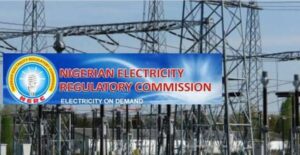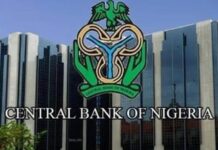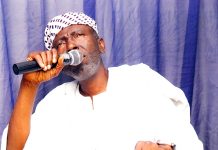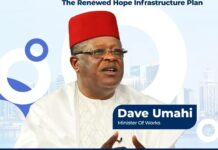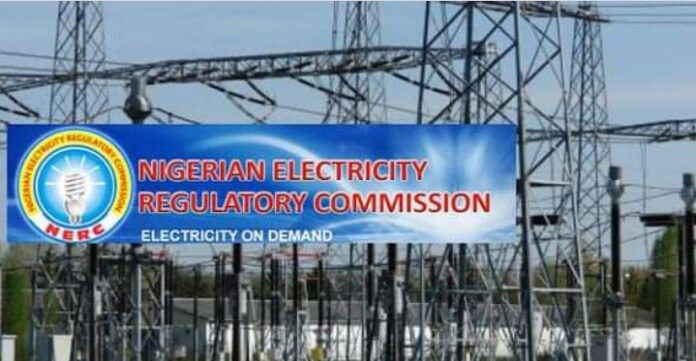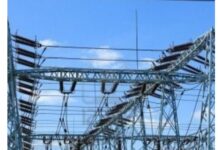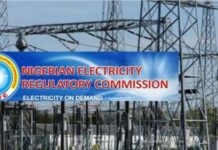…Cites increase in infrastructure investment as reason for hike in electricity tariff
…Downgrades 300 feeders for failing to supply 20hrs of electricity
…Mandates DisCos to migrate more customers to Band A
The Nigerian Electricity Regulatory Commission (NERC) has stated that the new electricity tariff will reduce the payments of subsidy on electricity by N1.14trn.
The Commission also identified the need for additional infrastructure investments as one of the reasons for the hike in the electricity tariff.
During a press briefing in Abuja on Wednesday Musliu Oseni, NERC’s Vice Chairman, announced that customers will now pay N225 per kilowatt-hour, up from the current rate of N66.
In a series of tweets yesterday, the Commission said, “The reason for the rate review for this about 15 percent customers include: The quality of infrastructure in NESI varies from one location to the other; there are certain locations where without any additional investment, the DisCos and the Transmission Company of Nigeria can deliver a minimum of 20 hours of power supply per day. But in some locations, there will be a need to increase the quality of the infrastructure before the hours of supply can improve.”
Explaining how the Commission reached its decision Oseni said, “NERC received applications from the Distribution Companies (DisCos) to review rates. Prior to this, NERC classified customers on the basis of service level of feeders where there is Band A, Band B, Band C, Band D and Band E.”
“NERC has reviewed the performance of these feeders leveraging on technology and has ordered the DisCos to downgrade many of the feeders immediately for not meeting the minimum 20-hour power supply.”
He explained that the commission had also downgraded some customers on the Band A to B and B due to non-fulfilment of the required hours of electricity provided by the electricity distribution company.
“We currently have 800 feeders that are categorised as B and A, but it will now be reduced to under 500. This means that 17 percent now qualify as Band A feeders. These feeders only service 15 percent of total electricity customers connected to the feeders.
Out of the over 3,000 DisCos’ feeders, 875 of them are in Band A but after the NERC review, they have been reduced to under 500 (around 480) feeders which qualify as B and A feeders and are currently meeting the 20-hour average service,” he explained.
According to him the commission has issued an order which is titled April supplementary order and the commission allows a 235 kilowatt per hour.
He added that the review will not affect customers on the other Bands.
“Customers in other Bands are not affected as they do not get power supply for up to 20 hours. NERC will monitor DisCos to ensure the migration of those customers to better electricity supply.”
He explained that the commission had also downgraded some customers on the Band A to B and B due to non-fulfilment of the required hours of electricity provided by the electricity distribution company.
“We currently have 800 feeders that are categorised as B and A, but it will now be reduced to under 500. This means that 17 percent now qualify as Band A feeders. These feeders only service 15 percent of total electricity customers connected to the feeders.
Out of the over 3,000 DisCos’ feeders, 875 of them are in Band A but after the NERC review, they have been reduced to under 500 (around 480) feeders which qualify as B and A feeders and are currently meeting the 20-hour average service,” he explained.
According to him the commission has issued an order which is titled April supplementary order and the commission allows a 235 kilowatt per hour.
He added that the review will not affect customers on the other Bands.
Customers in other Bands are not affected as they do not get power supply for up to 20 hours. NERC will monitor DisCos to ensure the migration of those customers to better electricity supply.”
A statement by the Commission also read, “The Federal Government of Nigeria has indicated a transition in policy direction towards introducing a more targeted subsidy regime aimed at mitigating the impact of changes in macroeconomic parameters while largely protecting vulnerable customers and fostering investments targeted at providing efficient service delivery in the Nigerian Electricity Supply Industry (NESI).
“The Commission has conducted a thorough review of the tariff applications submitted by the eleven (11) successor electricity distribution companies in line with the processes established in our regulations and Business Rules.
SEARCH
Nigerian NewsDirect
Nigerian NewsDirect
TOP STORYNew tariff to reduce electricity subsidy by N1.14trn — NERCPublished 3 hours ago on April 4, 2024By NewsDirect
…Cites increase in infrastructure investment as reason for hike in electricity tariff
…Downgrades 300 feeders for failing to supply 20hrs of electricity
…Mandates DisCos to migrate more customers to Band A
The Nigerian Electricity Regulatory Commission (NERC) has stated that the new electricity tariff will reduce the payments of subsidy on electricity by N1.14trn.
The Commission also identified the need for additional infrastructure investments as one of the reasons for the hike in the electricity tariff.
During a press briefing in Abuja on Wednesday Musliu Oseni, NERC’s Vice Chairman, announced that customers will now pay N225 per kilowatt-hour, up from the current rate of N66.
In a series of tweets yesterday, the Commission said, “The reason for the rate review for this about 15 percent customers include: The quality of infrastructure in NESI varies from one location to the other; there are certain locations where without any additional investment, the DisCos and the Transmission Company of Nigeria can deliver a minimum of 20 hours of power supply per day. But in some locations, there will be a need to increase the quality of the infrastructure before the hours of supply can improve.”
Explaining how the Commission reached its decision Oseni said, “NERC received applications from the Distribution Companies (DisCos) to review rates. Prior to this, NERC classified customers on the basis of service level of feeders where there is Band A, Band B, Band C, Band D and Band E.”
“NERC has reviewed the performance of these feeders leveraging on technology and has ordered the DisCos to downgrade many of the feeders immediately for not meeting the minimum 20-hour power supply.”
He explained that the commission had also downgraded some customers on the Band A to B and B due to non-fulfilment of the required hours of electricity provided by the electricity distribution company.
“We currently have 800 feeders that are categorised as B and A, but it will now be reduced to under 500. This means that 17 percent now qualify as Band A feeders. These feeders only service 15 percent of total electricity customers connected to the feeders.
“Out of the over 3,000 DisCos’ feeders, 875 of them are in Band A but after the NERC review, they have been reduced to under 500 (around 480) feeders which qualify as B and A feeders and are currently meeting the 20-hour average service,” he explained.
According to him the commission has issued an order which is titled April supplementary order and the commission allows a 235 kilowatt per hour.
He added that the review will not affect customers on the other Bands.
“Customers in other Bands are not affected as they do not get power supply for up to 20 hours. NERC will monitor DisCos to ensure the migration of those customers to better electricity supply.”
A statement by the Commission also read, “The Federal Government of Nigeria has indicated a transition in policy direction towards introducing a more targeted subsidy regime aimed at mitigating the impact of changes in macroeconomic parameters while largely protecting vulnerable customers and fostering investments targeted at providing efficient service delivery in the Nigerian Electricity Supply Industry (NESI).
“The Commission has conducted a thorough review of the tariff applications submitted by the eleven (11) successor electricity distribution companies in line with the processes established in our regulations and Business Rules.
“The review process was preceded by an analysis of the Performance Improvement Plans of the licensees and included a public hearing during which interested stakeholders and intervenors examined the rate filing submitted by the public utilities.
“The overarching objective of the Commission in the consideration of the tariff application is the creation of a financially sustainable electricity market providing adequate and reliable power supply to drive the Nigerian economy.
“The Commission, upon due consideration of the tariff applications, has approved revised rates affecting ONLY customers classified under Band A service category (about 15% of the customer population); empirical service data has confirmed that this class of customers have truly received the committed level of service.
“Under the revised tariff Order issued by the Commission, DisCos are under an obligation to provide customers classified under Band A service category a minimum average supply of 20hrs/day measured over a period of one week.
SEARCH
Nigerian NewsDirect
Nigerian NewsDirect
TOP STORYNew tariff to reduce electricity subsidy by N1.14trn — NERCPublished 3 hours ago on April 4, 2024By NewsDirect
…Cites increase in infrastructure investment as reason for hike in electricity tariff
…Downgrades 300 feeders for failing to supply 20hrs of electricity
…Mandates DisCos to migrate more customers to Band A
The Nigerian Electricity Regulatory Commission (NERC) has stated that the new electricity tariff will reduce the payments of subsidy on electricity by N1.14trn.
The Commission also identified the need for additional infrastructure investments as one of the reasons for the hike in the electricity tariff.
During a press briefing in Abuja on Wednesday Musliu Oseni, NERC’s Vice Chairman, announced that customers will now pay N225 per kilowatt-hour, up from the current rate of N66.
In a series of tweets yesterday, the Commission said, “The reason for the rate review for this about 15 percent customers include: The quality of infrastructure in NESI varies from one location to the other; there are certain locations where without any additional investment, the DisCos and the Transmission Company of Nigeria can deliver a minimum of 20 hours of power supply per day. But in some locations, there will be a need to increase the quality of the infrastructure before the hours of supply can improve.”
Explaining how the Commission reached its decision Oseni said, “NERC received applications from the Distribution Companies (DisCos) to review rates. Prior to this, NERC classified customers on the basis of service level of feeders where there is Band A, Band B, Band C, Band D and Band E.”
“NERC has reviewed the performance of these feeders leveraging on technology and has ordered the DisCos to downgrade many of the feeders immediately for not meeting the minimum 20-hour power supply.”
He explained that the commission had also downgraded some customers on the Band A to B and B due to non-fulfilment of the required hours of electricity provided by the electricity distribution company.
“We currently have 800 feeders that are categorised as B and A, but it will now be reduced to under 500. This means that 17 percent now qualify as Band A feeders. These feeders only service 15 percent of total electricity customers connected to the feeders.
“Out of the over 3,000 DisCos’ feeders, 875 of them are in Band A but after the NERC review, they have been reduced to under 500 (around 480) feeders which qualify as B and A feeders and are currently meeting the 20-hour average service,” he explained.
According to him the commission has issued an order which is titled April supplementary order and the commission allows a 235 kilowatt per hour.
He added that the review will not affect customers on the other Bands.
“Customers in other Bands are not affected as they do not get power supply for up to 20 hours. NERC will monitor DisCos to ensure the migration of those customers to better electricity supply.”
A statement by the Commission also read, “The Federal Government of Nigeria has indicated a transition in policy direction towards introducing a more targeted subsidy regime aimed at mitigating the impact of changes in macroeconomic parameters while largely protecting vulnerable customers and fostering investments targeted at providing efficient service delivery in the Nigerian Electricity Supply Industry (NESI).
“The Commission has conducted a thorough review of the tariff applications submitted by the eleven (11) successor electricity distribution companies in line with the processes established in our regulations and Business Rules.
“The review process was preceded by an analysis of the Performance Improvement Plans of the licensees and included a public hearing during which interested stakeholders and intervenors examined the rate filing submitted by the public utilities.
“The overarching objective of the Commission in the consideration of the tariff application is the creation of a financially sustainable electricity market providing adequate and reliable power supply to drive the Nigerian economy.
“The Commission, upon due consideration of the tariff applications, has approved revised rates affecting ONLY customers classified under Band A service category (about 15% of the customer population); empirical service data has confirmed that this class of customers have truly received the committed level of service.
“Under the revised tariff Order issued by the Commission, DisCos are under an obligation to provide customers classified under Band A service category a minimum average supply of 20hrs/day measured over a period of one week.
“All other customers under Band B to E service category and representing 85% of customers population would not be affected by the current review of end-user tariffs. All DisCos have been provided with mandatory targets for investments and migration of more customers to Band A service category.
“With the newly approved tariffs, subsidies for the 2024 fiscal year are expected to reduce by about NGN1.14 trillion in furtherance of the Federal Government’s realignment of the subsidy regime.
“The Commission has established a robust monitoring framework leveraging on technology to ensure that the public have visibility of the service covenant with their service providers.
“An enforcement and compensation mechanism has also been established, in the event of service failure. We wish to assure all Nigerians that the Commission working in collaboration with the policymakers remains committed towards providing adequate and reliable electricity to all citizens as we work diligently with state governments to deliver on the gains of the Electricity Act 2023,” the statement read.
Meanwhile, Socio-Economic Rights and Accountability Project, SERAP, has said that it will file a suit to sue the Federal Government for the increment whole, also calling for a reversal of the increment.
“We’re suing the Tinubu administration over the arbitrary increase in electricity tariff from N66 to N225 despite the difficult economic realities in the country, and the pending lawsuit on the matter.
SEARCH
Nigerian NewsDirect
Nigerian NewsDirect
TOP STORYNew tariff to reduce electricity subsidy by N1.14trn — NERCPublished 3 hours ago on April 4, 2024By NewsDirect
…Cites increase in infrastructure investment as reason for hike in electricity tariff
…Downgrades 300 feeders for failing to supply 20hrs of electricity
…Mandates DisCos to migrate more customers to Band A
The Nigerian Electricity Regulatory Commission (NERC) has stated that the new electricity tariff will reduce the payments of subsidy on electricity by N1.14trn.
The Commission also identified the need for additional infrastructure investments as one of the reasons for the hike in the electricity tariff.
During a press briefing in Abuja on Wednesday Musliu Oseni, NERC’s Vice Chairman, announced that customers will now pay N225 per kilowatt-hour, up from the current rate of N66.
In a series of tweets yesterday, the Commission said, “The reason for the rate review for this about 15 percent customers include: The quality of infrastructure in NESI varies from one location to the other; there are certain locations where without any additional investment, the DisCos and the Transmission Company of Nigeria can deliver a minimum of 20 hours of power supply per day. But in some locations, there will be a need to increase the quality of the infrastructure before the hours of supply can improve.”
Explaining how the Commission reached its decision Oseni said, “NERC received applications from the Distribution Companies (DisCos) to review rates. Prior to this, NERC classified customers on the basis of service level of feeders where there is Band A, Band B, Band C, Band D and Band E.”
“NERC has reviewed the performance of these feeders leveraging on technology and has ordered the DisCos to downgrade many of the feeders immediately for not meeting the minimum 20-hour power supply.”
He explained that the commission had also downgraded some customers on the Band A to B and B due to non-fulfilment of the required hours of electricity provided by the electricity distribution company.
“We currently have 800 feeders that are categorised as B and A, but it will now be reduced to under 500. This means that 17 percent now qualify as Band A feeders. These feeders only service 15 percent of total electricity customers connected to the feeders.
“Out of the over 3,000 DisCos’ feeders, 875 of them are in Band A but after the NERC review, they have been reduced to under 500 (around 480) feeders which qualify as B and A feeders and are currently meeting the 20-hour average service,” he explained.
According to him the commission has issued an order which is titled April supplementary order and the commission allows a 235 kilowatt per hour.
He added that the review will not affect customers on the other Bands.
“Customers in other Bands are not affected as they do not get power supply for up to 20 hours. NERC will monitor DisCos to ensure the migration of those customers to better electricity supply.”
A statement by the Commission also read, “The Federal Government of Nigeria has indicated a transition in policy direction towards introducing a more targeted subsidy regime aimed at mitigating the impact of changes in macroeconomic parameters while largely protecting vulnerable customers and fostering investments targeted at providing efficient service delivery in the Nigerian Electricity Supply Industry (NESI).
“The Commission has conducted a thorough review of the tariff applications submitted by the eleven (11) successor electricity distribution companies in line with the processes established in our regulations and Business Rules.
“The review process was preceded by an analysis of the Performance Improvement Plans of the licensees and included a public hearing during which interested stakeholders and intervenors examined the rate filing submitted by the public utilities.
“The overarching objective of the Commission in the consideration of the tariff application is the creation of a financially sustainable electricity market providing adequate and reliable power supply to drive the Nigerian economy.
“The Commission, upon due consideration of the tariff applications, has approved revised rates affecting ONLY customers classified under Band A service category (about 15% of the customer population); empirical service data has confirmed that this class of customers have truly received the committed level of service.
“Under the revised tariff Order issued by the Commission, DisCos are under an obligation to provide customers classified under Band A service category a minimum average supply of 20hrs/day measured over a period of one week.
“All other customers under Band B to E service category and representing 85% of customers population would not be affected by the current review of end-user tariffs. All DisCos have been provided with mandatory targets for investments and migration of more customers to Band A service category.
“With the newly approved tariffs, subsidies for the 2024 fiscal year are expected to reduce by about NGN1.14 trillion in furtherance of the Federal Government’s realignment of the subsidy regime.
“The Commission has established a robust monitoring framework leveraging on technology to ensure that the public have visibility of the service covenant with their service providers.
“An enforcement and compensation mechanism has also been established, in the event of service failure. We wish to assure all Nigerians that the Commission working in collaboration with the policymakers remains committed towards providing adequate and reliable electricity to all citizens as we work diligently with state governments to deliver on the gains of the Electricity Act 2023,” the statement read.
Meanwhile, Socio-Economic Rights and Accountability Project, SERAP, has said that it will file a suit to sue the Federal Government for the increment whole, also calling for a reversal of the increment.
“We’re suing the Tinubu administration over the arbitrary increase in electricity tariff from N66 to N225 despite the difficult economic realities in the country, and the pending lawsuit on the matter.
“The Tinubu administration must reverse the apparently unlawful increase in electricity tariff from N66 to N225 pending the hearing and determination of the suit we filed on the matter, to protect the integrity of the judicial process and the rule of law,” a statement by the rights group read.
Reacting also, the Peoples Redemption Party (PRP) has condemned the increase in the electricity tariff describing it as a cynically cruel blow on Nigerians.
In a statement by the PRP Acting National Publicity Secretary, Comrade Muhammed Ishaq, the party said the action is not acceptable against the backdrop that the drastic hike was coming on the heels of the removal of fuel subsidies and massive devaluation of the Naira, which have brought increases in costs of living and resultant hardship to the populace, adding that it brings additional burden on the already struggling Nigerians.
According to Ishaq, the PRP is calling on the government to, as a matter of urgency, reconsider this decision and prioritise the well-being of its citizens, just as the party urged the authorities to explore alternative solutions that will not further exacerbate the suffering of Nigerians.
SEARCH
Nigerian NewsDirect
Nigerian NewsDirect
TOP STORYNew tariff to reduce electricity subsidy by N1.14trn — NERCPublished 3 hours ago on April 4, 2024By NewsDirect
…Cites increase in infrastructure investment as reason for hike in electricity tariff
…Downgrades 300 feeders for failing to supply 20hrs of electricity
…Mandates DisCos to migrate more customers to Band A
The Nigerian Electricity Regulatory Commission (NERC) has stated that the new electricity tariff will reduce the payments of subsidy on electricity by N1.14trn.
The Commission also identified the need for additional infrastructure investments as one of the reasons for the hike in the electricity tariff.
During a press briefing in Abuja on Wednesday Musliu Oseni, NERC’s Vice Chairman, announced that customers will now pay N225 per kilowatt-hour, up from the current rate of N66.
In a series of tweets yesterday, the Commission said, “The reason for the rate review for this about 15 percent customers include: The quality of infrastructure in NESI varies from one location to the other; there are certain locations where without any additional investment, the DisCos and the Transmission Company of Nigeria can deliver a minimum of 20 hours of power supply per day. But in some locations, there will be a need to increase the quality of the infrastructure before the hours of supply can improve.”
Explaining how the Commission reached its decision Oseni said, “NERC received applications from the Distribution Companies (DisCos) to review rates. Prior to this, NERC classified customers on the basis of service level of feeders where there is Band A, Band B, Band C, Band D and Band E.”
“NERC has reviewed the performance of these feeders leveraging on technology and has ordered the DisCos to downgrade many of the feeders immediately for not meeting the minimum 20-hour power supply.”
He explained that the commission had also downgraded some customers on the Band A to B and B due to non-fulfilment of the required hours of electricity provided by the electricity distribution company.
“We currently have 800 feeders that are categorised as B and A, but it will now be reduced to under 500. This means that 17 percent now qualify as Band A feeders. These feeders only service 15 percent of total electricity customers connected to the feeders.
“Out of the over 3,000 DisCos’ feeders, 875 of them are in Band A but after the NERC review, they have been reduced to under 500 (around 480) feeders which qualify as B and A feeders and are currently meeting the 20-hour average service,” he explained.
According to him the commission has issued an order which is titled April supplementary order and the commission allows a 235 kilowatt per hour.
He added that the review will not affect customers on the other Bands.
“Customers in other Bands are not affected as they do not get power supply for up to 20 hours. NERC will monitor DisCos to ensure the migration of those customers to better electricity supply.”
A statement by the Commission also read, “The Federal Government of Nigeria has indicated a transition in policy direction towards introducing a more targeted subsidy regime aimed at mitigating the impact of changes in macroeconomic parameters while largely protecting vulnerable customers and fostering investments targeted at providing efficient service delivery in the Nigerian Electricity Supply Industry (NESI).
“The Commission has conducted a thorough review of the tariff applications submitted by the eleven (11) successor electricity distribution companies in line with the processes established in our regulations and Business Rules.
“The review process was preceded by an analysis of the Performance Improvement Plans of the licensees and included a public hearing during which interested stakeholders and intervenors examined the rate filing submitted by the public utilities.
“The overarching objective of the Commission in the consideration of the tariff application is the creation of a financially sustainable electricity market providing adequate and reliable power supply to drive the Nigerian economy.
“The Commission, upon due consideration of the tariff applications, has approved revised rates affecting ONLY customers classified under Band A service category (about 15% of the customer population); empirical service data has confirmed that this class of customers have truly received the committed level of service.
“Under the revised tariff Order issued by the Commission, DisCos are under an obligation to provide customers classified under Band A service category a minimum average supply of 20hrs/day measured over a period of one week.
“All other customers under Band B to E service category and representing 85% of customers population would not be affected by the current review of end-user tariffs. All DisCos have been provided with mandatory targets for investments and migration of more customers to Band A service category.
“With the newly approved tariffs, subsidies for the 2024 fiscal year are expected to reduce by about NGN1.14 trillion in furtherance of the Federal Government’s realignment of the subsidy regime.
“The Commission has established a robust monitoring framework leveraging on technology to ensure that the public have visibility of the service covenant with their service providers.
“An enforcement and compensation mechanism has also been established, in the event of service failure. We wish to assure all Nigerians that the Commission working in collaboration with the policymakers remains committed towards providing adequate and reliable electricity to all citizens as we work diligently with state governments to deliver on the gains of the Electricity Act 2023,” the statement read.
Meanwhile, Socio-Economic Rights and Accountability Project, SERAP, has said that it will file a suit to sue the Federal Government for the increment whole, also calling for a reversal of the increment.
“We’re suing the Tinubu administration over the arbitrary increase in electricity tariff from N66 to N225 despite the difficult economic realities in the country, and the pending lawsuit on the matter.
“The Tinubu administration must reverse the apparently unlawful increase in electricity tariff from N66 to N225 pending the hearing and determination of the suit we filed on the matter, to protect the integrity of the judicial process and the rule of law,” a statement by the rights group read.
Reacting also, the Peoples Redemption Party (PRP) has condemned the increase in the electricity tariff describing it as a cynically cruel blow on Nigerians.
In a statement by the PRP Acting National Publicity Secretary, Comrade Muhammed Ishaq, the party said the action is not acceptable against the backdrop that the drastic hike was coming on the heels of the removal of fuel subsidies and massive devaluation of the Naira, which have brought increases in costs of living and resultant hardship to the populace, adding that it brings additional burden on the already struggling Nigerians.
According to Ishaq, the PRP is calling on the government to, as a matter of urgency, reconsider this decision and prioritise the well-being of its citizens, just as the party urged the authorities to explore alternative solutions that will not further exacerbate the suffering of Nigerians.
The statement read, “The Peoples Redemption Party (PRP) has read the report of the proposed 300 percent increase in electricity tariffs and strongly condemns the same as this will result in the power companies raising prices of electricity from N68 to N200 per kilowatt-hour.”
This drastic hike, coming on the heels of the removal of fuel subsidies and massive devaluation of the Naira, which have brought increases in costs of living and resultant hardship to the populace, is an unconscionable burden on the already struggling Nigerian populace.
“As a party that champions the welfare of the people, we express our deep concern and share the shock felt by millions of Nigerians who are grappling with the harsh realities of survival. This decision by the government is not only insensitive but also demonstrates a blatant disregard for the plight of the citizens.
“The removal of fuel subsidies has already made life unbearable for Nigerians, and the additional burden of a 300 percent increase in electricity tariffs is a merciless and ruthless policy at a time when the majority of the population is struggling to meet their basic needs like food. It is unimaginable that the government would impose such life-frustrating policies on a nation that is already on its knees.
“The PRP calls on the government to reconsider this decision and prioritise the well-being of its citizens. We urge the authorities to explore alternative solutions that will not further exacerbate the suffering of Nigerians.
“Government should urgently consider seriously investing in the exploration and expansion of alternative renewable sources of electricity supply such as solar, bio gas, wind, etc which have the potential of providing cheap and sustainable electric energy to Nigerians for their domestic, economic and industrial needs. The current economic situation demands empathy, understanding, and a collective effort to uplift the people, not policies that push them deeper into hardship.
“In addition to the evident detrimental effects that a 300 percent surge in electricity bills would impose on Nigerians, it is crucial to acknowledge the substantial impact it would have on medium and small enterprises, as well as the informal sector.
“This significant hike in energy costs could potentially cripple these vital components of our economy, leading to potential job losses and hindering overall growth and development.
“Finally, we stand in solidarity with the millions of Nigerians who are affected by these policies and pledge to continue advocating for their rights and interests. The PRP remains committed to working towards a better future for all Nigerians, where basic necessities like food, electricity and fuel are accessible and affordable.”
